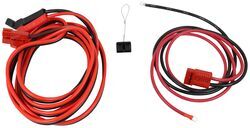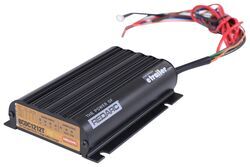
7-Way Lead Gets Hot When Running Battery Charger Line Through Trailer Connector
Question:
I installed a DC-DC charger in my trailer, not yours but equivalent to your Redarc BCDC1212 item RED96FR. While charging at full rate it could probably pull up to 400 watts of power. Power is transferred through the 7 pin connector to the trailer. When charging depleted batteries the 7 pin connector gets very hot to the point of softening the plastic around the positive pin on the plug. I do have a bit of voltage from battery to 7 pin 2020 Chev Colorado long bed crew cab so there may be 30-35 amps flowing through the 7 pin. Can the 7 pin safely pass 35 amps? it seems not owing to the heating The power pin is quite small while the ground pin is much larger. The vehicle socket is a pollak that looks like your item #PK11893. Is there an option that will safely pass more current? will replace both plug and socket Do I need to rig up a separate higherinch amperage connector to bypass the 7 pin? Seems to me like many trailers/5th wheels will have this issue especially if installing a charger like the Redarc BCDC1240 charger. Thanks for any advice/suggestions/recommendations you might share.
asked by: Joseph O
Expert Reply:
The amperage rating of the battery charge line circuit which is run through the trailer connector will be based on the vehicle as not all are the same. That said, most trucks can handle up to 40 amps. If you see yourself exceeding this rating or your vehicle is rated lower you will need to separate the circuit from the trailer connector, we generally use winch wiring like the Bulldog Winch Booster Cable Set part # BDW20197 for this.
Please note, you will want to pay careful attention to the size of wire used with transferring high amps across distance so I do recommend you review the wiring portion of the install, the gauge of wire in particular.

Products Referenced in This Question
Bulldog Winch Booster Cable Set w/ Power Leads - Quick Connect to Clamp - 2 Gauge - 20' Long
- Jump Starters and Jumper Cables
- Jumper Cables
- 2 Gauge Wire
- 20 Feet Long
- Quick Connect Leads
- Bulldog Winch
more information >
Product Page this Question was Asked From
Redarc In-Vehicle BCDC Battery Charger - Single Input - DC to DC - 12V/24V - 12 Amp
- Battery Charger
- Battery Charger
- RV/Camper
- Trailer
- Charges Only
- 12V
- 24V
- Vehicle Battery to Auxiliary Battery
- Redarc
more information >
Featured Help Information
Instructions

Continue Researching
- Shop: Redarc In-Vehicle BCDC Battery Charger - Single Input - DC to DC - 12V/24V - 12 Amp
- Shop: Bulldog Winch Booster Cable Set w/ Power Leads - Quick Connect to Clamp - 2 Gauge - 20' Long
- Video: Redarc In-Vehicle BCDC Battery Charger Review
- Article: How to Charge a Trailer Battery While Driving: 3 Common Problems (And How to Fix Them)
- Article: How to Charge a Dump Trailer Battery
- Q&A: Do Two Power Wires Run to the Redarc In-Vehicle BCDC Battery Charger
- Q&A: Will Redarc Battery Charger BCDC Get Hot When in Use
- Article: Trailer Wiring Diagrams
- Q&A: Does the Redarc BCDC Receive Power From the 7 Way Connector
- Q&A: Dexter Electric Over Hydraulic Actuator Runs But Does Not Build Pressure
- Shop: Dexter DX Series Electric Over Hydraulic Brake Actuator for Disc Brakes - 1,600 psi
- Shop: LED Amber Quad Flash Kit for Trucks and Trailers, 6.5" Oval
- Shop: Trailer Wiring
- Video: Review of Equal-i-zer Pins and Thumb Clips For Weight Distribution Spring Bars - EQ95-01-9415
- Q&A: Can Redarc BCDC Charger Be Used with 7-Way Connector to Charge Trailer Battery
- Shop: RV Electrical
- Shop: RV Power Cord
- Shop: Hughes Autoformers Replacement Hardwire RV Plug - 30 Amp Male
- Q&A: Can I Charge My Trailer Battery Using 7-Way Trailer Connector on Truck
- Q&A: How Does The Redarc In-Vehicle BCDC Battery Charger Get Power?
- Shop: Dexter Trailer Hub and Drum Assembly for 2,000-lb Axles - 7" - 5 on 4-1/2
- Shop: etrailer Horizontal E Track - Black Powder Coated Steel - 2,000 lbs - 94" Long - Qty 4
- Search Results: flexiride
- Video: Review of Hughes Autoformers - Replacement RV Male Plug - HU93FR
- Video: Review of Mighty Cord RV Wiring - Replacement 30a Plug - A10-P30VP
- Search Results: dc dc charger
- Search Results: redarc
- Article: Tech Bulletin: Redarc - Installing a BCDC1212T on a Dump Trailer
- Shop: Roof Rack
- Search Results: 7 inch brakes







Joseph O.
11/3/2021
Thanks for responding but you didn't answer my question. Yes, the wiring from truck battery to 7 pin should be upgraded. But the wiring in my truck doesn't get warm. The 7-pin, on the other hand, gets hot enough to soften the plastic indicating a high resistance connection. The wiring in my truck may be perfectly adequate with the voltage drop experienced at my DC-DC charger attributed to significant resistance in the 7-pin connector. Can the 7-pin connector safely pass 350 watts of power? (that's about 26 to 32 amps depending on voltage at the connector). The contacts in the 7-pin are pretty small. Contacts in 30 amp trolling motor plug designed to conduct 30 amps are substantially larger than the 7-pin contacts (c.f. Marinco 12VBRS2). You suggest upgrading the wiring in the truck but do not address how to transfer that power to the trailer. Use the 7-pin connector? Wire in a separate connector designed for higher amperage? Something else?